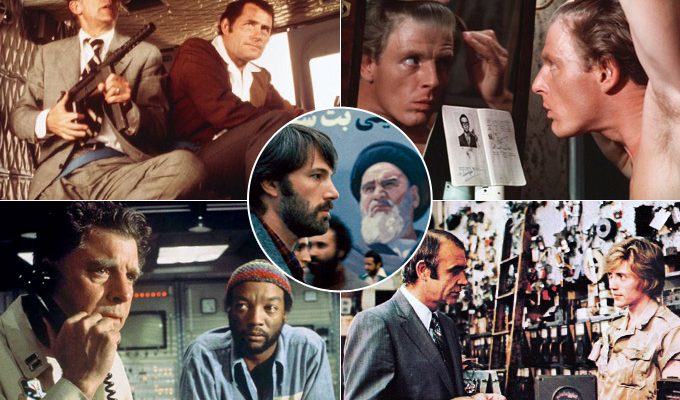 “The Anderson Tapes” (1974)
“The Anderson Tapes” (1974)
Starring Sean Connery, boasting the feature debut of Christopher Walken and directed by Sidney Lumet, what’s not to love about this heist and crime thriller? Well, it turns out, quite a bit. While the actors are fine — including character actors Dyan Cannon, Martin Balsam, Ralph Meeker, and comedian Alan King playing against type as a mob boss — the material is weak and the pace and direction is often far from thrilling. Connery plays Duke Anderson, a just-released career-criminal who uses mob funding to pull off an ambitious heist. He recruits prison pals (Walken, Stan Gottlieb) and is also forced to work with men he doesn’t know or fully trust (Val Avery, Paul Benjamin). What he doesn’t knows is his every move is being taped and surveilled by several law enforcement agencies trying to put a squeeze on the mobsters. Being that it’s the ’70s and fads came into vogue, the film is punctuated and peppered by a transitional Quincy Jones-written score of swirling electronic hiccups, burbs and farts, surely there to imply the sinister machinations of being observed and tracked at all times, but serving nothing other than to make the picture appear more dated than it is (the rest is overly jazzy in a Lalo Schifrin sort of overdone way). During its heist, the picture picks up and the character actors are interesting throughout, but “The Anderson Tapes” lacks the spark and rudder of most classic crime thrillers from the ’70s. The second Connery/Lumet collaboration of five films together, the movie is a minor Lumet misfire, but at 98 minutes, it actually relatively painless as well. [C+] “The Odessa File” (1974)
“The Odessa File” (1974)
Based on the best-selling novel by “Day of the Jackal” author Frederick Forsyth, “The Odessa File” begins with an almost “Indiana Jones“-y prologue, where sweaty Nazis conspire in the desert about launching warheads that will effectively wipe out Israel (some are nuclear bombs while others carry germs and other assorted nastiness). This is followed by on-screen text (by Forsyth) claiming that the film is based on “carefully documented research,” that Odessa really existed, and that that there really was a plot hatched after World War II by former Hitler higher-ups to launch an attack that would effectively end Israel. Um. Okay, except that the real Odessa was mainly used to facilitate the escape and relocation of former Nazis, sort of like an evil version of the Underground Railroad. Anyway, “The Odessa File” is still a crackling thriller about a reporter (Jon Voight, rocking a surprisingly solid German accent) who, immediately following the Kennedy assassination (and the suicide of an elderly concentration camp survivor), sets about to infiltrate and expose the mysterious and sinister Odessa. The film boasts a score by Andrew Lloyd Webber (probably the least annoying thing he’s ever composed) and a scenery-obliterating performance by Maximilian Schell as Eduard Roschmann, the so-called “Butcher of Riga.” Ronald Neame directs with all the seriousness he can muster (it mostly works), and it’s aided hugely by British cinematographer Oswald Morris‘ lush, almost 3D photography. Its provocative historical setting gives it some much-needed oomph, even if the premise sometimes borders on the insanely ludicrous. [B]
 “The Internecine Project” (1974)
“The Internecine Project” (1974)
Perhaps the weakest thriller in this bunch, sometimes you wonder if studios just picked out a semi-enigmatic word out of a hat and said, “I wonder if we could make a thriller out of this?” Not to be confused with American writer-director-producer Barry Levinson, ‘Internecine’ was produced and written by the other American Barry Levinson (i.e. the guy who had nothing to do with “Diner,” “Good Morning Vietnam,” “Rain Man,” etc. and sadly has no interesting credits to his name). Starring James Coburn, this mildly interesting but mostly unremarkable and run-of-the-mill-thriller centers on a cunning and opportunistic former secret agent on his way to become a key Presidential advisor. However, he’s got a shady past, so he concocts an intricate plan where the four people who have dirt on him — including a high-class prostitute and a masseur — will kill one another. While Lee Grant (as a journalist and former lover) and Harry Andrews have some colorful supporting turns within, the rest of the cast is as forgettable as the movie. Notable British jazz musician and composer Roy Budd (“Get Carter“) wrote the score, but it’s not particularly compelling. Directed by British filmmaker and writer Ken Hughes (known for “Chitty Chitty Bang Bang” and 1967’s “Casino Royale“), if you’re looking to fill all the holes and gaps in your ‘70s thriller knowledge, we suppose you can take the movie for a requisite spin, but it’s for completeist die-hards of the genre only. [C-]

